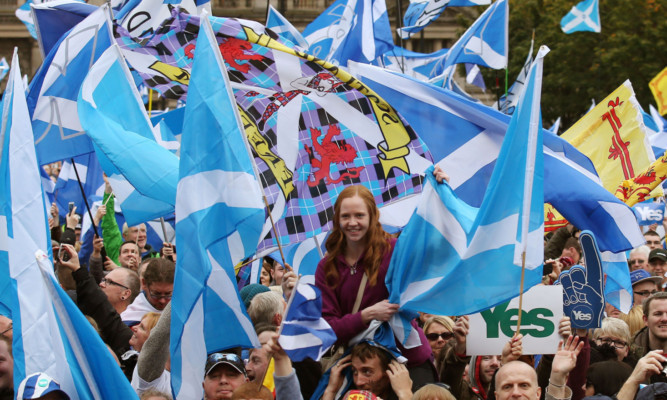A majority of people in the UK believe Scotland will become an independent country despite the No vote in last year’s referendum, according to a study.
In Scotland, 69% believe there will be a split while 59% of those surveyed in England, 54% in Wales and 59% in Northern Ireland think that Scotland will eventually leave the UK.
The findings are from a survey of more than 7,000 voters across the UK by a team of researchers from Edinburgh University.
The level of engagement around the referendum looks to have had a legacy with 76% of Scots who took part saying they will vote in May’s election, compared to 63% in England, 64% in Wales and 55% in Northern Ireland.
The contrast is bigger among young people, with 65% of 18 and 19-year-olds in Scotland saying they will vote compared to just 34% in England.
The survey also found satisfaction with the UK’s current constitutional arrangements varies.
In England, 43% believe their country receives less Government spending than it is due while the figure is 44% in Scotland, 37% in Northern Ireland and 68% in Wales.
The researchers found there is majority agreement that a referendum on Britain’s membership of the European Union (EU) should be decided by a majority of votes across the UK instead of individual countries being allowed to veto the result.
In Scotland, 45% support a proposal that each of England, Scotland, Wales and Northern Ireland would have to vote in favour of an EU exit for it to happen. In the other countries, support is lower.
Dr Daniel Kenealy said: “Despite Nicola Sturgeon’s call for an EU referendum veto by the four nations of the UK and First Minister of Wales Carwyn Jones’s support for the idea, it remains unpopular with people across the UK.
“This shows us that on some issues people across the UK still think in terms of a single political unit making big decisions.”
A majority of people would like all devolved administrations to have control over the same powers, the study found, while most people said not enough time has been spent discussing constitutional issues.
Despite the views on constitutional issues, those surveyed do not believe “ordinary people” have a big influence on how the UK is run.
Politicians, parties, businesses, trade unions and local councils are seen to hold greater influence on the running of the country.
